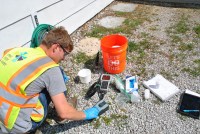Latest KFF Health News Stories
Can Family Doctors Deliver Rural America From Its Maternal Health Crisis?
Family medicine doctors already deliver most of rural America’s babies, and efforts to train more in obstetrics care are seen as a way to cope with labor and delivery unit closures.
Child Care Gaps in Rural America Threaten to Undercut Small Communities
Deep gaps in rural America’s child care system threaten communities’ stability by shrinking the workforce and inhibiting economic potential. Now that pandemic-era federal aid for child care programs and low-income families has ended, it’s up to state and local leaders to find solutions.
States Expand Health Coverage for Immigrants as GOP Hits Biden Over Border Crossings
More than 1 million immigrants, most lacking permanent legal status, are covered by state health programs. Several states, including GOP-led Utah, will soon add or expand such coverage.
Mental Health Courts Can Struggle to Fulfill Decades-Old Promise
Mental health courts have been touted as a means to help reduce the flow of people with mental illness into jails and prisons. But the specialized diversion programs can struggle to live up to that promise, and some say they’re a bad investment.
La mayoría de los adultos sin papeles trabajan, representan aproximadamente el 5% de la fuerza laboral nacional, según el Pew Research Center.
An Arm and a Leg: ‘An Arm and a Leg’: When Hospitals Sue Patients (Part 2)
Why do hospitals sue patients who can’t afford to pay their medical bills? On this episode of “An Arm and a Leg,” host Dan Weissmann investigates such lawsuits and covers new laws and regulations that may change this practice.
RFK Jr.’s Campaign of Conspiracy Theories Is PolitiFact’s 2023 Lie of the Year
Debate and speculation are heating up over whether Robert F. Kennedy Jr.’s presidential campaign will factor into the outcome of the 2024 election. But one thing is clear: Kennedy’s political following is built on a movement that seeks to legitimize conspiracy theories.
In Year 6, KFF Health News-NPR’s ‘Bill of the Month’ Helps Patients in a Changing System
In the sixth year of the KFF Health News-NPR “Bill of the Month” series, patients shared more than 750 tales of medical billing problems, and reporters analyzed more than $730,000 in charges — including more than $215,000 owed by 12 patients and their families.
Bold Changes Are in Store for Medi-Cal in 2024, but Will Patients Benefit?
California’s Medicaid program is undergoing major changes that could improve health care for residents with low incomes. But they are happening at the same time as several other initiatives that could compete for staff attention and confuse enrollees.
‘AGGA’ Inventor Testifies His Dental Device Was Not Meant for TMJ or Sleep Apnea
The FDA and Department of Justice are investigating the Anterior Growth Guidance Appliance, or “AGGA.” TMJ and sleep apnea patients have filed lawsuits alleging the device harmed them. Its inventor now says the AGGA was never meant for these ailments.
Cancer Patients Face Frightening Delays in Treatment Approvals
Delaying cancer treatment can be deadly — which makes the roadblock-riddled process that health insurers use to approve or deny care particularly daunting for oncology patients.
Se avecinan cambios para Medi-Cal en 2024, pero ¿beneficiarán a los pacientes?
A partir del próximo año, más de 700,000 inmigrantes sin papeles serán elegibles para una cobertura completa de Medi-Cal.
KFF Health News' 'What the Health?': 2023 Is a Wrap
2023 was another busy year in health care. As the covid-19 pandemic waned, policymakers looked anew at long-standing obstacles to obtaining and paying for care in the nation’s health care system. Meanwhile, abortion has continued to be an issue in much of the nation, as states respond to the Supreme Court’s 2022 decision overturning the constitutional right to the procedure. This week, Rachel Cohrs of Stat, Sandhya Raman of CQ Roll Call, and Joanne Kenen of Johns Hopkins University and Politico Magazine join KFF Health News chief Washington correspondent Julie Rovner to discuss these issues and wrap up the year in health. Also this week, Rovner interviews KFF Health News’ Jordan Rau about his joint KFF Health News-New York Times series “Dying Broke.”
The Year in Opioid Settlements: 5 Things You Need to Know
In the past year, opioid settlement money has gone from an emerging funding stream for which people had lofty but uncertain aspirations to a coveted pot of billions being invested in remediation efforts. Here are some important and evolving factors to watch going forward.
Inside the Pentagon’s Painfully Slow Effort to Clean Up Decades of PFAS Contamination
Cost estimates balloon and complications mount as the Defense Department grapples with PFAS pollution at hundreds of its bases and surrounding communities.
Deep Flaws in FDA Oversight of Medical Devices, and Patient Harm, Exposed in Lawsuits and Records
Thousands of medical devices are sold, and even implanted, with no safety tests.
What a Bison Goring Can Teach Us About Rural Emergency Care
Millions of Americans live in “ambulance deserts” — areas that are more than a 25-minute drive to the nearest emergency medical services (EMS) station. The most rural areas can be more than an hour away from help. These sparsely populated communities can have trouble sustaining ambulance services, if small patient volumes and low reimbursements […]
A New Test Could Save Arthritis Patients Time, Money, and Pain. But Will It Be Used?
Stories of chronic pain, drug-hopping, and insurance meddling are all too common among patients with rheumatoid arthritis. Precision medicine offers new hope.
‘I Am Just Waiting to Die’: Social Security Clawbacks Drive Some Into Homelessness
The Social Security Administration is reclaiming billions of dollars in alleged overpayments from some of the nation’s poorest and most vulnerable, leaving some people homeless or struggling to stay in housing, beneficiaries and advocates say.
The Market for Biosimilars Is Funky. The Industry Thinks PBMs Are To Blame
Over the past year there’s been movement to rein in the three big PBMs, which face little regulation though they help set drug prices and drug choices for 80 percent of Americans and their doctors. The House voted Dec. 11, 320-71, for legislation that would require the PBMs to change some of the ways they […]



















